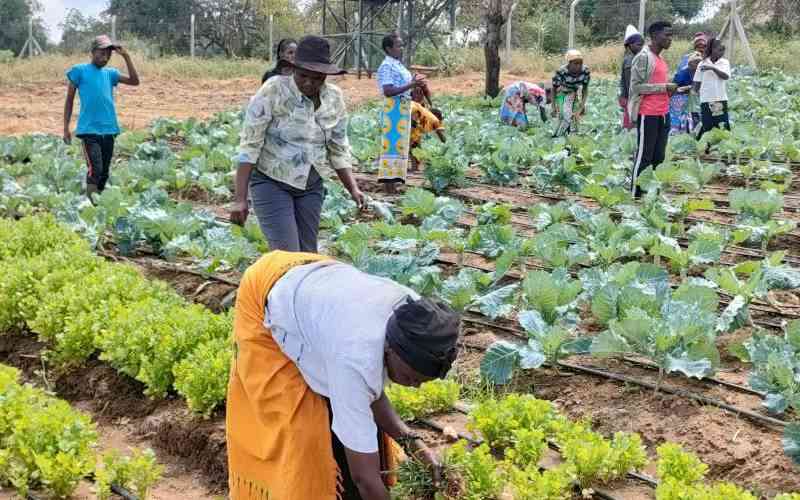One in every five people in Africa is undernourished due to insufficient nutritious food, a World Bank report shows.
This translates to 230 million Africans. This number could rise to 350 million by 2050 if appropriate adaptation measures are not taken to cope with the intensity of future climate change.
According to the report released at the ongoing Africa Green Revolution Forum (AGRF) conference at UN, Gigiri, a projected rise in extreme weather conditions and average temperatures of about two degree Celsius by mid-century could substantially reduce the land suitable for growing the main staple crops, and reduce crop yields by up to 20 per cent.
African agriculture is highly vulnerable to climate risks but is also a source of greenhouse gas (GHG) emissions.
The report notes that climate change and food insecurity are the twin crises that may define Africa's future.
Food production in Sub-Saharan Africa (SSA) needs to increase by 60 per cent over the next 15 years to feed a growing population.
Feeding Africa nutritiously and sustainably will require a more sustainable and climate-smart food system. Without major investments in agriculture, the average African would have access to 21 per cent fewer calories and climate change would increase the number of malnourished children by 10 million.
The report notes that if unaddressed, climate change will erode Africa's hard-won development achievements and jeopardise the prospects for further growth and poverty reduction.
Fortunately, African agriculture is well-positioned for transformational change. Throughout Africa, there are over 200 million hectares of uncultivated land that can be brought to productive use.
Africa uses only two per cent of its renewable water sources. Africa's food and beverage markets are expected to top $1 trillion (Sh101 trillion) in value by 2030. More than a dozen agribusiness investment funds have set their sights on Africa.
African agriculture is also energised by entrepreneurial youth and an engaged private sector that is taking note of its potential. Young Africans are making agriculture a viable business, creating opportunities for farmers, as well as themselves.
The report found that while agriculture contributes to the climate problem, producing significant greenhouse gas emissions, it also has the potential to be part of the solution here in Africa. Improved practices can help African countries increase productivity, while also enhancing the resilience of farming systems, and achieving lower emissions–the triple win of climate-smart agriculture.
The Africa Climate Business Plan was launched in Paris to address Africa's intricately linked climate and development agendas.
The plan calls for $16 billion (Sh1.6 trillion) in funding to help Africans adapt to climate change and build up the continent's resilience to climate shocks. The plan includes a focus on climate-smart agriculture and supports the vision for the accelerated agricultural transformation of the Malabo Declaration.
 The Standard Group Plc is a
multi-media organization with investments in media platforms spanning newspaper
print operations, television, radio broadcasting, digital and online services. The
Standard Group is recognized as a leading multi-media house in Kenya with a key
influence in matters of national and international interest.
The Standard Group Plc is a
multi-media organization with investments in media platforms spanning newspaper
print operations, television, radio broadcasting, digital and online services. The
Standard Group is recognized as a leading multi-media house in Kenya with a key
influence in matters of national and international interest.
 The Standard Group Plc is a
multi-media organization with investments in media platforms spanning newspaper
print operations, television, radio broadcasting, digital and online services. The
Standard Group is recognized as a leading multi-media house in Kenya with a key
influence in matters of national and international interest.
The Standard Group Plc is a
multi-media organization with investments in media platforms spanning newspaper
print operations, television, radio broadcasting, digital and online services. The
Standard Group is recognized as a leading multi-media house in Kenya with a key
influence in matters of national and international interest.






